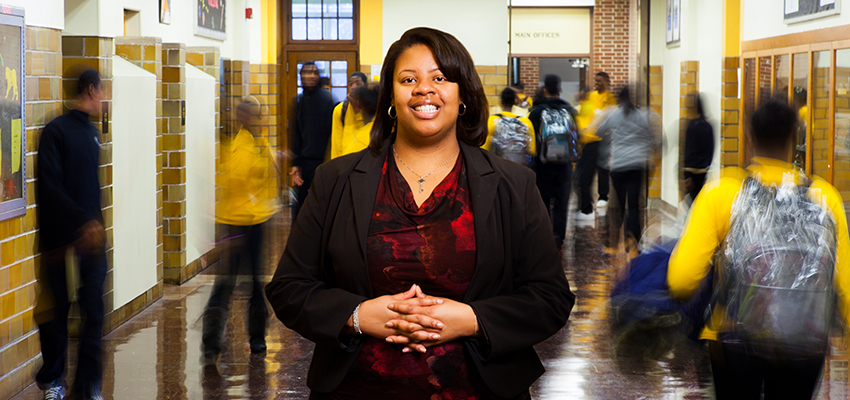Being a first-time school principal is hard enough.
Now imagine that your school was in such bad shape two years ago that the state took it over and put a private management company in charge. On top of that, your school is located in a very violent community outside Chicago, with only 5 percent of students reading at their grade level and one of your biggest problems is simply getting the kids to show up.
Now picture leading that school at age 30.
That’s the challenge facing Donna Henry ’04, an Illinois State alumna who is now principal at Theodore Roosevelt College and Career Academy in Gary, Indiana. Now in only her second semester as principal at Roosevelt, Henry’s leadership has already made a big difference on student attendance and staff morale, said longtime colleague Carmen Roberts.
“It’s amazing the impact she’s had,” said Roberts, the school’s director of student support.
Henry always knew she wanted to be an educator. Illinois State was the only school to which she applied, and in 2000 she arrived in Normal as a self-described “misguided student from the south side of Chicago.” As the first in her family to go away to college, she didn’t know what to expect.
To achieve her dream of teaching, the English teacher education major worked two jobs while at ISU, and took Summer Session classes to stay on track for graduation.
After graduation, she taught one year at an alternative school before being hired at Chicago International Charter School (CICS) Longwood to teach 12th grade English. She was young, but she felt well-prepared pedagogically to have a significant impact on her students.
Before long, she was given more and more responsibility, first as a lead teacher, then as a curriculum coordinator, then assistant principal. Earning her master’s degree in Chicago, she came to Roosevelt first an assistant principal before taking over the top job permanently this school year.
“It’s that ‘aha moment,’ when you can see on the student’s face, that moment of understanding, that they get it. That’s just awesome to me,” Henry told STATEside. “I genuinely have a passion for this. I like helping people understand and see things more clearly.”
Turnaround school challenges
The state of Indiana took over locally run Roosevelt due to its poor academic track record, hiring the private company EdisonLearning to improve performance. It is Henry’s first time working in a “turnaround” school environment, and it comes with a uniquely tangled set of challenges.
Her student population is “highly mobile,” meaning that for every student she loses, two more transfer in, with a steady churn bringing former students back. But as daunting as their poor reading skills may be, Henry’s first challenge was reintroducing her students to the simplest concepts of school–how to go to class, take notes, and even walk on the correct side of the hallway.
“We have a major task ahead of us,” said Henry, now 31.
And Henry doesn’t have the benefit of being part of a local school district, where she could turn to other nearby administrators for advice, said Roberts. And the Gary community presents its own socioeconomic challenges; the students don’t even have a reliable city transit system.
“This is truly, truly a disadvantaged community, like nothing we’d ever seen before,” said Roberts, who also worked with Henry at the CICS Longwood charter school.
But Henry’s leadership is making a difference in big and small ways, Roberts said. The principal’s open-door policy has resonated with students, and there have been fewer disciplinary infractions and higher attendance this year, said Roberts. And staff morale is up thanks to gestures such as a new weekly newsletter, penned by Henry, that highlights teacher achievements.
“She’s definitely a caring person who is serious about the charge she’s been given,” Roberts said.
As she transitions from teacher to administrator, Henry said she is thankful for what Illinois State’s teacher education program has done for her career. She points to the real-world practice she received as a student, first through observations at University High School, then with lesson planning and other curriculum development training, and culminating with student-teaching at a Normal high school.
“In my years of teaching and leading, I have come to recognize that there is an obvious difference in teacher preparation programs across the state,” Henry said. “It may be my bias, but Illinois State-trained teachers really come prepared, with a different frame of mind.”
Ryan Denham can be reached at rmdenha@IllinoisState.edu.



